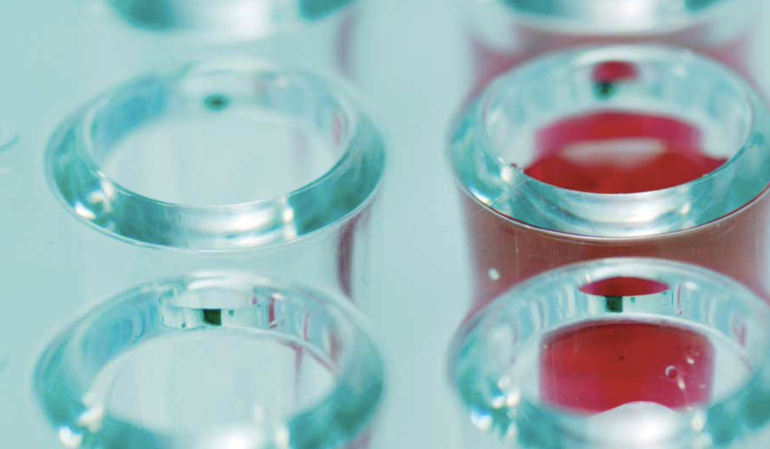While most of us will agree that our health is our most valuable asset in life, how many of us are truly living in an optimal state of health? Are you relying on annual exams and basic bloodwork as a path to longevity and good health? Do you know your risk factors or the triggers that are potentially fueling future disease?
“While traditional medicine has been important in the prevention of heart attacks and strokes and lowering blood pressure, the overall preventive aspect of medicine has been very weak,” explains Eric Verdin, MD, CEO + President of the Buck Institute. “We need to stop the idea that you are considered healthy until you are suddenly sick or have a catastrophic event when we know there is gradation. We need to identify who is at risk very early and why. This is why biomarkers are important tools to be employed to allow us to monitor our health.”Biomarkers measure different aspects of your condition, revealing where you are in your trajectory of health. They can measure the presence or progress of disease, the effects of treatment, and can be good predictors of what the future may hold, so a healthcare provider can intervene aggressively when needed.
“This approach will usher in a different era of medicine which will be much more preventative and more focused on who is at risk,” adds Dr. Verdin. We conferred with a group of experts in various areas of health to get the latest cutting-edge information on key markers, important testing, screenings and vital information that you may want to discuss with your own healthcare provider.
Cardiovascular Disease + Inflammation
Expert: Mimi Guarneri, MD

Guarneri Integrative Health
Pacific Pearl, La Jolla, CA
“Cardiovascular disease is still the number one cause of death in men and women, but the medical world has been following the wrong markers for many years,” says Dr. Mimi Guarneri, a cardiologist and integrative medicine specialist who co-founded Pacific Pearl in La Jolla, California. According to Guarneri, cardiologists now believe inflammation plays a bigger role in coronary artery disease than cholesterol. Studies have shown high-sensitivity C-reactive protein (hs-CRP) to be more important than low-density lipoprotein (LDL) cholesterol, meaning if two people have the same LDL cholesterol, it’s the one with the higher hs-CPR that does worse with cardiovascular disease. “It’s an inflammatory disease with some very specific markers that everyone should know,” adds Guarneri. In addition to watching your cholesterol levels, it’s imperative to test for inflammation as a preventative and life-saving measure.
Biomarkers for Cardiovascular Disease
Dr. Guarneri suggests checking the following which can predict cardiovascular disease.
Advanced Lipid Panel: checks LDL size and LDL-particle numbers
ApoB: measures potential artery-clogging HDL2B: indicates how well excess lipids are removed from cells
Oxidized LDL: reveals LDL cholesterol damaged by free radicals
Hs-CRP: reveals overall inflammation levels.
Lp-PLA2 + MPO: specifies artery inflammation (PULS score: predicts the risk for a cardiovascular event over the next 5 years)
TMAO: high levels of this gut bacteria byproduct can lead to the development of cardiovascular disease, including heart attacks and stroke
Get Help
Guarneri Integrative Health
Dr. Mimi Guarneri, who pioneered the Scripps Center for Integrative Medicine, is the co-founder and medical director of Guarneri Integrative Health at Pacific Pearl in La Jolla, California, where state-of-the-art Western medicine meets the best of holistic and global healing traditions. She is also president of the Academy of Integrative Health and Medicine. Board-certified in cardiology, internal medicine and nuclear cardiology, Dr. Guarneri leads a team of experts in conventional, integrative and natural medicine.
Cleveland Clinic
This renowned, multi-specialty academic medical center integrates clinical and hospital care with research and education. For 26 consecutive years, the Cleveland Clinic has been ranked as the #1 heart program in the US for heart and vascular disorders, tests, treatments and prevention by the U.S. News & World Report’s “Best Hospitals” list. Stanley Hazen, MD, PhD, the head of Preventive Cardiology, led the team at the Cleveland Clinic to first identified TMAO as a cardiac biomarker in 2018. TMAO is produced when gut bacteria digest choline, lecithin and carnitine — nutrients that are abundant in animal products such as red meat and liver. The clinic offers extensive inflammation testing at their Cleveland Heat Lab.
Inflammation in General
“Chronic inflammation is like a smoldering fire,” says Dr. Guarneri. “It can play a significant role in cancer, Alzheimer’s, diabetes, autoimmune diseases, arthritis and more. So if inflammation is driving the train, we have to see where it is coming from.”
Sources of inflammation range from food sensitivities and gut issues to heavy metals, stress and environmental toxins. Functional testing can reveal how the brain or gut is working and these tests should be done in addition to traditional bloodwork.
Biomarkers for Inflammation
The highly respected Mayo Clinic has sleep disorder campuses in Arizona, Minnesota and Florida. Progressive treatments can be found for narcolepsy, REM disorder, restless leg syndrome, insomnia, sleep apnea and more.
“Good sleep is a cornerstone of top health,” relays Dr. Ari Laliotis, board-certified internal medicine and sleep medicine doctor at Sharp Rees-Stealy Medical Group in Del Mar, California. “Practicing good sleep hygiene is a critical part of this. For most, that means trying to maintain a regular bed and wake time, avoiding distractions in bed, such as phones and laptops, and consulting with your primary care doctor if sleep becomes more of a problem.” Sleep deprivation causes cortisol levels to go up, blood pressure to rise, weight gain, higher blood sugar, weakened immunity, mood swings and more. In addition to the adrenaline stress index to check cortisol, you may want to be tested for the respiratory disorder obstructive sleep apnea.
Bloodwork
For general inflammation investigation, Dr. Guarneri suggests Hs-CRP, Lp-PLA2, MPO, oxidized LDL, and PULS score, the same ones recommended for cardio-related inflammation, along with Homocysteine, TNF alpha + Interleukin 16, which all test for inflammation. But as Guarneri aptly points out, “it’s not only about ordering these tests, it’s knowing how to interpret them, leading to treatment strategies to prevent disease.”
Micronutrient Assessment A blood and urine test through NutrEval Plasma® evaluates over 125 biomarkers and assesses the body’s functional need for 40 antioxidants, vitamins, minerals, essential fatty acids, amino acids, digestive support and other select nutrients. This test also screens for heavy metals which can cause cardiovascular disease and cognitive decline. “With heart and cognitive disease linked to oxidative stress, it’s important to look at antioxidant and micronutrient levels,” adds Guarneri.
Food Sensitivities Assessment
Discovering one’s food sensitivities can be done with bloodwork and through an elimination diet. Culprits include soy, dairy, nuts, eggs, wheat and gluten-containing grains. Food sensitivities cause low-grade chronic inflammation with symptoms like headaches, joint and muscle pain, sinus congestion, IBS, brain fog and more.
Microbiome Assessment
A three-day stool test looks at the cross-section of the bacteria strain living in the gut and inflammation markers (calprotectin and secretory IgA), along with pathogens and parasites. Another important marker in the microbiome to note is Trimethylamine N-oxide (TMAO), as high levels are linked to cardiovascular disease.
Adrenal Stress Index
This 24-hour salivary test determines levels of cortisol, a stress hormone that can wreak havoc in the body. If cortisol is too high it can be addressed with nutraceuticals or adaptogens. “Ongoing stress can make you feel fatigued all the time as the body pumps out cortisol to the point where you can’t sleep at night. It’s like being on steroids,” explains Guarneri. The goal is to balance the hormones.
Get Help
These two progressive tests deliver insight into your inflammation so you can take action and change the course of your health.
IAge®
The novel Inflammatory Age® test measures one very specific aspect of aging
— systemic chronic inflammation, the root cause of major age-related diseases. Based on a 10-year National Institutes of Health (NIH) funded longitudinal research from Stanford University and advanced artificial intelligence methods, a team at Stanford developed the world’s first biomarker composite scoring system to measure inflammatory and immune health of an individual. Inflammatory Age®, founded by Buck faculty member David Furman, PhD, predicts cumulative damage , as measured by the accumulation of up to 10 major diseases of aging. Based on test results, Edifice Health, a spin-off company to commercialize the comprehensive data collected from the Stanford project, has identified over 150 actionable interventions to improve your Inflammatory Age® including targeted nutritional supplements, immunoactive food ingredients and medical foods.
Glycan Age
This team in London has created a test for biological age and wellness based on glycans, sugar molecules that cover our proteins. Bloodwork measures your IgG glycosylation, which directly correlates with the level of inflammation. The testing analyzes 24 glycans — carbohydrate-based polymers that regulate a variety of processes, includiing immunity — and combines the results to calculate your Glycan Age or biological age. After receiving your Glycan Age you receive a one-to-one consultation with a health specialist who analyzes the results and offers lifestyle interventions. Glycan Age stands out as the first biological age test that has proven responsiveness to lifestyle (and pharma) interventions with statistical significance.
Bone Health
Expert: Kevin Ellis Integrative Health Coach + Bone Health Advocate

BoneCoach.com
St. Louis, MO
Our bones provide structure, protect our organs, anchor muscles and store calcium. And yet they are constantly changing, as new bone is created and old bone is broken down. Ninety percent of our bone mass is acquired by age 18, and this amount peaks at age 30. From there it’s a decline, gradual for some, while others are not so fortunate. Myriad factors can contribute to bone loss — from age, nutrition deficiencies, hormone levels and gut issues, to stress, poor sleep, medications and other health conditions. Most doctors don’t recommend getting a DEXA scan to track bone density until we are in our 50s to 60s, which is often far too late.
When it comes to testing, Bone Coach Kevin Ellis says, “the earlier the better so you can establish a baseline to monitor.” Anyone who had an eating disorder, poor diet and nutrition, health issues, or who is postmenopausal, should get a DEXA scan as well. The results of that DEXA scan will indicate one of three things: normal bone density, osteopenia, or osteoporosis. Osteopenia indicates you have lower bone density than normal with an increased likelihood of developing osteoporosis. Osteoporosis means “porous bone” and is an indicator of reduced bone strength and an increase in fracture risk.
If diagnosed with osteopenia or osteoporosis, many doctors will immediately recommend pharmaceuticals like Fossamax or Prolio, but according to Ellis, there’s more biomarker testing to be done and questions to ask before taking drugs that can have severe long-term consequences. Ellis suggests that patients also request a C-Telopeptide (CTX) blood test. This looks at the activity level of the cells (osteoclasts) that break down and resorb bone. “If the activity level of those cells is high, it could be an indicator of active bone loss.” Other important tests he recommends include Vitamin D levels, parathyroid hormone, thyroid function, inflammation levels, and tTG-IgA and Total Serum IGA testing to rule out celiac disease. “Many people with celiac disease are asymptomatic and lack the classic GI symptoms, unaware that the villi in the small intestines are being damaged, contributing to the malabsorption of nutrients. If key bone-healthy nutrients like calcium and phosphorus aren’t being absorbed, your body will pull those minerals from the bones to serve other purposes in the body,” adds Ellis.
Medications can also affect bone health as studies are showing that SSRI’s, PPI’s/proton pump inhibitors, corticosteroids like Prednisone, and breast cancer medications can contribute to bone loss, so discuss the risk versus reward of taking these prescriptive drugs if you have osteoporosis with your healthcare provider.
Biomarkers for Bone Health
Understanding T + Z + TBS Scores
DEXA scans provide bone health scores that are important baselines to know. A T-score compares a person’s bone density with that of a healthy 30-year-old of the same sex. The Z-score compares a person’s bone density with that of an average person of the same age and sex.
Normal: A score of -1 or above
Osteopenia: A score between -1.1 and -2.4
Osteoporosis: A score of -2.5 and below.
If you have osteopenia or osteoporosis, in addition to getting your T-score and Z-score, ask your healthcare provider if their DEXA machine has a Trabecular Bone Score (TBS) capability as this new technology and recently-developed analytical tool can assess the quality of your bone — another important piece to the bone health puzzle. Find a medical group that offers TBS.
Get Help
BoneCoach.com
Kevin Ellis, a certified integrative health coach and bone health advocate, has helped people in over 1500+ cities around the world with osteopenia and osteoporosis address bone loss, build bone strength, stop fearing fracture, and lead active lives. He and his team of experts offer the latest cutting-edge research, interactive counseling and guidance, bone-specific nutrition, hormonal and sleep advice, stress reduction, and bone-strong exercise and physical therapy plans. Their holistic approach is to identify and address bone loss, nourish the body with minerals and nutrients that are properly absorbed, and build strength of body, mind, and bone in ways that prevents fracture and injury.
OSTEOSTRONG
Located across the country, these wellness studios focus on skeletal strength and use a process known as Osteogenic Loading
— brief, intensive resistance exercise to stimulate the bone building cells. These sessions can be a great complement to your bone health plan to improve bone density, posture and balance, but anyone with osteoporosis should first check with their healthcare provider to see if osteogenic loading is appropriate for your bone health protocol.
Genetic Testing
Expert: Eric Verdin, MD, CEO and President

The Buck Institute of Research for Aging + Longevity
Novato, CA
You’ve heard it before: genes are not destiny. Science has shown that the environmental and lifestyle choices like eating well, exercise and sufficient deep sleep play a much greater role than genetic factors in regard to our health and longevity. “When you look at relative risk in terms of health and life span, the relative roles of your genes versus your environment and lifestyle, the latest number is about 7 percent of the outcomes are from your genes. It’s a really minor component,” explains Buck Institute CEO Eric Verdin. “That said, there is some value in genetic testing.”
Genetic testing for pregnancy issues and specific forms of cancer can be an effective tool. If you have a family history of breast or ovarian cancer, ask your healthcare provider about testing for the BRCA1 and BRAC2 mutations. Testing for Factor V Leiden makes sense when there is a history of miscarriages and blood clots. Even the home test kits like 23andMe look for both of these genetic variants, along with others like the APOe4 mutation, which is predictive for increased risk of Alzheimer’s. Since most people diagnosed with Alzheimer’s disease are already 80 to 90 percent into the process, early detection is key since science is working to uncover potential preventive therapies and treatments.
But one also has to consider the psychological toll of gene sequencing, which can also create a burden of worry and fear. “This is when you have to remind yourself about the relative importance of your genes compared to your lifestyle choices,” says Verdin. “That exercising, eating well, sleeping enough — factors you can control — are so much more important than knowing what your genes are.”
Still Verdin encourages people who are interested in their health to get all the information they can. “But you should have a reasonable expectation of what genomic testing really tells you as it’s somewhat limited. At this point, we do not know to read the human genome very well, but I suspect this will change.”
Biomarkers for Aging and Longevity
Cutting-edge science is providing new ways to understand and measure the factors that cause cognitive decline and accelerate aging. And while there are many biomarkers for a variety of diseases from anxiety to diabetes and cancer, here’s some information on Alzheimer’s Disease and epigenetic clocks.
Alzheimer’s Disease
Genetic variations in fat-metabolizing Apolipoproteins (APOe) are associated with Alzheimer’s disease and those carrying the APOe4 allele are at increased risk for developing Alzheimer’s disease; the APOe2 variant is protective. Research shows that Alzheimer’s is influenced by many factors including toxin exposure, inflammation, chronic pathogens, vascular compromise, trauma and insulin resistance. While there is much to learn about this disease that affects more than five million people, biomarkers for Alzheimer’s could provide detailed measures of abnormal changes in the brain, inflammation, insulin levels, gut integrity and the blood brain barrier and may help in predicting, monitoring and preventing the progression of the disease.
Epigenetic Clocks
Epigenetics is the study of changes in organisms caused by modification of gene expression rather than alteration of the genetic code itself. It focuses on how your behaviors and environment can cause changes that affect the way your genes work. Biological age is the way in which your cells have changed over time and can be influenced by many different lifestyle factors versus one’s chronological age.
Geneticist Steve Horvath at the University of California, Los Angeles, a pioneer in epigenetic-clock research, created the Horvath Clock. It measures biomarkers of DNA methylation at 353 different sites in the genome to reveal one’s biological age, which can be either similar or different from your chronological age and correlated to lifespan and health span. Other examples of epigenetic clocks include the PhenoAge Clock by Dr. Morgan Levine at Yale and the GrimAge Clock created by Ake Lu from UCLA.
Get Help
23andMe
These affordable, director-to-consumer genetic test kits deliver information on ancestry and assess genetic risk for 10 conditions approved by the FDA (Parkinson’s, Celiac, Alzheimer’s and more), though results are not intended to diagnose any health-related issues. DNA is extracted from a saliva sample that’s tested to spot genetic variations as a means to encourage people to be aware of their genetic risks and be more proactive about their health and longevity. Kits start at $199.
Human Longevity Inc.
American-born biochemist-geneticist J. Craig Venter helped crack the genetic code by sequencing the first human genome
and deciphering essentially all the genes in human DNA in hopes of providing keys to the diagnosis and treatment of numerous diseases from diabetes and heart disease to Alzheimer’s and various cancers. He cofounded the company Human Longevity Inc., which offers full genetic assessments to the public with a goal to use this genetic knowledge to transform treatments from reactive to proactive, preventative and personalized. Prices range from $5,500 for basic testing to upwards of $25,000 for full genetic assessment.
Pharmacogenomics
The Way of the Future
Genetic testing has entered the world of pharmacology as pharmacogenomics is the study of how genes affect the body’s response to certain medicines. Before you commit to prescriptives like anti-depressants, statins, or beta blockers, you should consider pharmacogenetics testing to determine how your body metabolizes specific medications to see which drug works best for your genetic inheritance. This relatively new field will help reduce adverse drug reactions; make better, safer medications; establish more accurate methods of determining appropriate drug dosages; and create better vaccines.
Vaccines like the Covid-19 Messenger RNA (mRNA) are made from genetic material versus a live virus, and promise all the benefits of existing vaccines without all the risks. They activate the immune system by teaching our cells how to make a protein that triggers an immune response, but don’t cause potential infections thanks to pharmacogenomics.
Biomarkers on the Brink
The Development of Senescence-Associated Biomarkers
The Buck Institute is studying the SASP (Senescence-Associated Secretory Phenotype), a group of pro-inflammatory molecules that are secreted by cells that are senescent — damaged cells that are no longer capable of dividing. “With age, there is an accumulation of these senescent cells that are spewing off SASP which causes chronic inflammation. We suspect this will be another biomarker — determining the SASP load in the body,” explains Verdin. To that end, the Buck Institute has created a Proteomic Atlas of Senescence-Associated Secretomes, a database of proteins for the research community. The hope is that these biomarkers will help identify factors that drive aging and disease in specific tissues. Unity Biotechnology is in clinical trials with two drugs which would eliminate senescent cells in diabetic eye disease and osteoarthritis.
Stiffness as a Marker of Age and Inflammation Factor
As we age, our tissues get stiffer which causes tension in our cells. At some point this stiffness can result in fibrosis, which damages our organs. Buck Associate Professor Dan Winer, MD, and his team have discovered that the cellular tension impacts our immune system, creating a negative feedback loop that contributes
to the low-grade chronic inflammation that fuels many of the diseases of aging: more inflammation results in more stiffness. Winer says technology that can track stiffness in organs currently exists. That technology could allow for early detection of stiffness and make it easier to test the efficacy of new drugs that would break the inflammatory loop.
Get Help
Companies like GeneSight, GenoMind, Admera all provide pharmacogenetic testing that makes use of this emerging science, looking at both the effect a drug has on your body (pharmacodynamic parameters) and how your body effects the drug (pharmacokinetic parameters).
How to Help:
For organizations to support and resources to help you and others through this difficult time, check out our Better List.
More from Marin:
- 4 Local Trainers’ Cardiovascular Fitness Tips and Favorite Heart-Healthy Foods
- 10 Major Medical Breakthroughs — and What They Could Mean for You
- Political Strategist, Organizer, Author and Marin Native Alicia Garza on What it Takes to Create Change
 Ann Wycoff is a travel and lifestyle writer whose work has appeared in San Diego Magazine, Coastal Living, Modern Luxury, and many more. She lives in Encinitas, CA with her husband and daughter, and believes in traveling with a purpose.
Ann Wycoff is a travel and lifestyle writer whose work has appeared in San Diego Magazine, Coastal Living, Modern Luxury, and many more. She lives in Encinitas, CA with her husband and daughter, and believes in traveling with a purpose.


